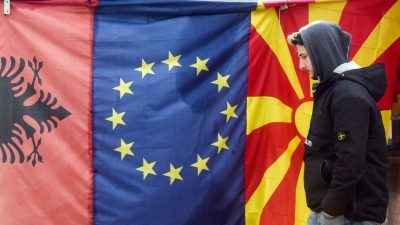Accelerating Albania and North Macedonia Membership EU Tries to Save Face Amidst Coronavirus Debacle

The European Union’s decision to open negotiations with Northern Macedonia and Albania is a propaganda act from Brussels that attempts to reassure members of the Union that countries, even in the midst of the epidemic, want to become members of the organization. This is a cheap propaganda trick that attempts to restore confidence in the European Union at a time when it has completely failed to deal with the coronavirus pandemic that has shown weakness in the alliance.
Maurizio Massari, Italy’s ambassador to the EU, said earlier this month that “the coronavirus crisis is a test of the EU’s cohesiveness and credibility — one that can only be passed through genuine, concrete solidarity. Europe must act according to the principle of mutual defense and help those members whose security is under threat.” With nearly 60,000 people confirmed infected and over 7,500 deaths, the European Union has failed in this test as no member states came to the aid of Italy and instead looked inwardly towards their own borders. The European Union’s cohesiveness was exposed as a fantasy when days ago member state Poland closed its airspace to a Russian plane delivering aid to fellow European Union member Italy, forcing the aircraft to take an alternate route that is 1,000 kilometers longer.
Essentially the European Union that is currently the epicenter of the coronavirus pandemic has exposed why the Union is dysfunctional and without any solidarity. It has shown a huge gap between words and action. The European Union as an example of the liberal world order endlessly spoke of humanity but have proven they are inhumane. They promoted the idea of efficiency but proven they are actually ineffective. In short, the announcement to progress the European Union membership of Albania and North Macedonia is a cheap propaganda gimmick for Brussels at a time when it is under heavy scrutiny for showing a lack of solidarity and assistance to Italy, raising questions to the credibility of the organization. It is negotiating in a way that has never existed, utterly undefined, with a big question mark as to what will be.
According to a draft decision signed by the bloc’s 27 members, which Reuters had access to, the hope of membership for the two Western Balkans countries has often been shattered in recent years due to the scepticism expressed, primarily by the Netherlands and France, as they correctly highlight that both countries are highly corrupt. However, the start date of the negotiations is not specified and will be subsequently determined when the European Commission prepares the framework for the negotiations.
Michael Roth, Germany’s state secretary for European affairs, wrote on Twitter on March 24, “Congrats to Tirana+Skopje, it’s well deserved,” after the agreement was reached during a videoconference. This was followed by European Union Enlargement Commissioner Oliver Varhelyi also going to Twitter, saying that he is “very pleased that EU member states today reached political agreement on opening of accession talks with Albania and North Macedonia. I wholeheartedly congratulate both countries. This also sends a loud and clear message to Western Balkans: your future is in EU.”
North Macedonia is unlikely to face resistance in joining the European Union, and is already being rapidly ascended into NATO after it resolved its name issue with Greece. However, the accession is not yet a guaranteed for Albania as Greece raises concerns on the rights and treatment of the Greek minority in occupied Northern Epirus in southern Albania. Approximately 200,000 Greeks of Northern Epirus face daily discrimination with Albanian authorities removing bilingual road signs that display Greek, the confiscation of property belonging to Greeks, and Albanian police even murdering a Greek in a shootout as they removed a Greek flag from a cemetery, among many other forms of discrimination. On these grounds, Greece may veto Albania’s accession, but this is likely to be a temporary measure as the Greek political establishment always eventually capitulate to the demands of Brussels and Germany. Once this issue is resolved, it is likely that Albania with North Macedonia will be accelerated into the European Union, and this will prove necessary as the bloc wants to maintain the illusion that it is not in disarray in the midst of the coronavirus pandemic.
This begs the questions though on why Albania and North Macedonia would want to ascend into the European Union after seeing the alliance’s treatment of its own long-time member states like Italy. Albania has always been a pro-Western state, owing to the Western world its existence, its occupation of Northern Epirus, and its indirect occupation of Kosovo. It is therefore unsurprising that it wants to be further integrated into the Western world. North Macedonia since the very beginning of its foundations with the dissolution of Yugoslavia in the early 1990’s wanted to join the European Union and NATO, but was prevented to do so because of the name dispute with Greece. With this issue resolved, it now has a clear path towards the bloc. None-the-less, both states are not even remotely close in an economic or so-called democratic sense to be candidates, but will be fast-tracked to help save face after the European Union’s debacle with the coronavirus pandemic.
*
Note to readers: please click the share buttons above or below. Forward this article to your email lists. Crosspost on your blog site, internet forums. etc.
This article was originally published on InfoBrics.
Paul Antonopoulos is a Research Fellow at the Center for Syncretic Studies.
Featured image is from InfoBrics

